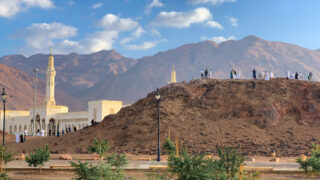The basis of the tolerance of Islam is its emphasis on the Oneness of God. It means that The Creator and Sustainer of the whole universe is One; that all humans whether white or black, brown or yellow are of equal status before God; that all the so-called monotheistic religions are basically one, since their origin is the guidance sent down by the One and Only God.
It may be surprising for many non-Muslims to know that the Muslims honor all the prophets of God, including Abraham, Moses, David and Jesus. Muslims have to respect all these prophets, just as they respect the last prophet, Muhammad (pbuh)
This brings us to the questions that may naturally arise when one reads the misconceptions and distorted image, which some missionaries repeat in order to make people shy away from Islam. One may wonder what the grounds for so much of animosity are. In fact there are a few reasons:
Islam is the only religion that has come up after Christianity, posing a real challenge to its supremacy.
Only Islam has questioned the basic tenets of Christianity, such as the Trinity, the divinity of Jesus and his atoning death on the cross.
In the past centuries, wherever there was a confrontation between Islam and Christianity at the ideological level, it was mostly Islam that has won.
In the contemporary world, even by conservative estimates, Islam is gaining over Christianity as the fastest growing religion.
The enemies of Islam imagine that the tide in favor of Islam can be reversed by certain concerted efforts on their side. However, they do not normally attack any of the fundamentals of Islam, such as:
The Oneness of God
The progressive revelation of divine guidance through the scriptures, culminating in the Last Testament (the Qur’an)
The inevitability of divine judgment on the basis of belief and action.
As for the Muslim criticism, it is invariably on the contemporary fundamental beliefs of Christianity, which are in fact deviations from the original teachings of Jesus. This is while the Christian detractors concentrate on vituperation.
Some do claim that the messenger of Islam was a terrorist. They base this charge on the fact that he fought many battles. This is although many other prophets of the Bible fought wars too! They also criticize the fact that Muhammad (pbuh) had nine wives. This is while it is also a fact that Abraham, David and Solomon (pbut) had numerous wives as well. Of course, Jesus did not marry; but can we say that this is sufficient reason to disapprove of marriage or even polygyny?
Now, let me move to the idea that the Qur’an demands that all Muslims kill all non-Muslims. What could be more self-contradictory than saying that Muslims are enticing non-Muslims to Islam, while at the same time asking Muslims to kill all non-Muslims?
A reflection of that matter will clear this misunderstanding. The Prophet started preaching Islam in Makkah, being only one man in the midst of all those polytheists. How could he convert all those supporters to make Arabia almost completely Muslim, if his policy had been killing non-Muslims?!
He was not a king or a ruler; but he became the unquestioned ruler of Arabia; and every letter of the Book of God he gave them became law. Was it out of the fear of being killed that all those non-Muslims embraced Islam? And would it have been possible ever since for his religion to be continuously gaining over Christianity, which is originally a religion of mercy, unless people have seen in Islam an ever-greater mercy?
The point is that it was not the religion of Moses or Jesus Christ that Muhammad was trying to replace. It was the misinterpretations and the distortions that happened to their religion that Muhammad wanted to replace, back to their original authentic teachings. In fact, his mission was to restore the pure religion of Noah, Abraham, Moses, David and Jesus (peace be upon them all). The Islamic view of the earlier religions is clear from the following verses of the Qur’an, Surah 42, verses 13 – 15:
*{He has made plain to you of the religion what He enjoined upon Nuh (Noah) and that which We have revealed to you and that which We enjoined upon Ibrahim (Abraham) and Musa (Moses) and Isa (Jesus) that keep to obedience and be not divided therein; hard to the unbelievers is that which you call them to; Allah chooses for Himself whom He pleases, and guides to Himself him who turns [to Him], frequently.
And they did not become divided until after knowledge had come to them out of envy among themselves; and had not a word gone forth from your Lord till an appointed term, certainly judgment would have been given between them; and those who were made to inherit the Book after them are most surely in disquieting doubt concerning it.
To this then go on inviting, and go on steadfastly on the right way as you are commanded, and do not follow their low desires, and say: I believe in what Allah has revealed of the Book, and I am commanded to do justice between you: Allah is our Lord and your Lord; we shall have our deeds and you shall have your deeds; no plea need there be [now] between us and you: Allah will gather us together, and to Him is the return.}*
If these are the teachings of the Holy Qur’an, how can anyone believe that it dictated Muslims to kill non-Muslims?!
It is true that God in His Book permits fighting, but only as a last resort. This is in the cases of:
– Fighting in the case of self-defense.
– Fighting to defend the right of everyone to believe in God and practice His religion.
– Fighting against brutal oppression and injustice.
In the time of the prophet, we find that he and his people were ruthlessly persecuted and forced out of their homes to flee their beloved town of Makkah. When the prophet (pbuh) and his followers were accorded a grand welcome in Madinah, by the people there, his enemies wanted to destroy the new religion that was taking root in the deserts of Arabia, even by eliminating Muhammad and his followers.
It was in this context that the verses permitting fighting were revealed. It was here that fighting against the kuffar (literally non-believers) is mentioned. Here, the meaning is clear: the non-believers mentioned are those who sought to kill the prophet and his followers, only. This is because, the Holy Qur’an clearly says in Surah 18, verse 29:
*{Say: The Truth is from your Lord – Let him who will, believe, and let him who will, reject [it] }*
The Qur’an also says in Surah 2, verse 256:
*{There is no compulsion in religion; truly the right way has become clearly distinct from error; therefore, whoever disbelieves in the false deities and believes in Allah, he indeed has laid hold on the firmest handle, which shall not break off, and Allah is Hearing, Knowing.}*
So, the stand of Islam here is very clear. Islam does not approve the use of force in the propagation of religion. Since God commands not to use any kind of compulsion in religion, it is obviously ridiculous to argue that the Qurï؟½an commands Muslims to kill non-Muslims. You can also read more about how Islam guarantees religious freedom.
As for the issue of the moon and relating it to paganism and Islam, nothing could be more absurd than this charge! Any one who has a cursory knowledge of Islam knows about its uncompromising stand against paganism.
In actual history, we can read how Muhammad, on the occasion of his conquest of Makkah, cleaned the Ka`ba of all the vestiges of paganism there. As for the moon, Muslims do not worship it; nor do they worship any gods or idols. Nor does any Muslim believe that the reason for their using the crescent as a symbol on their flag is that Muhammad (peace be upon him) had cut the moon in half with his sword!
That is a pure fabrication, a blatant lie about Muhammad and Islam. The moon, or the crescent is simply a symbol, related to the lunar calendar Muslims use.
The next criticism is: “Love is a completely foreign concept in Islam. Allah is destined to rule the world. That is the basis of Islam. Everything else is related to this goal.”
The question that arises here is: Do these critics want to say that Muslims are not humans, but another species or aliens?!
Is it possible for a human being to live without love?
In fact, we can endure painful diseases or brutal tortures; but the thought that there is nobody in the world for us to love, and to love us, is probably the most painful experience.
So to argue that love is alien to Islam is at best a strange idea! If this were true, missionaries would have been spared the trouble of parading all these false charges against Islam! Because, Islam would then have died a natural death long ago!
In the Holy Qur’an, God asks the Prophet in chapter 3, verse 31:
*{Say: “If you do love Allah, follow me: Allah will love you and forgive you your sins: For Allah is Oft-Forgiving, Most Merciful.}*
Also God says in Surah 3, verse 103:
*{And hold fast, all together, by the rope [the covenant] which Allah [stretches out for you], and do not be disunited; and remember with gratitude Allah’s favor on you; for you were enemies and He joined your hearts in love, so that by His Grace, you became brethren; and you were on the brink of the pit of fire, and He saved you from it. Thus does Allah make His signs clear to you that you may be guided.}*
Then in Surah 19, verse 96:
*{On those who believe and work deeds of righteousness, will the Most Gracious bestow love.}*
As for Surah 30, verse 21:
*{And among His Signs is this, that He created for you mates from among yourselves, that you may dwell in tranquility with them, and He has put love and mercy between you [your hearts]: verily in that are signs for those who reflect.}*
Also read the following sayings of Prophet Muhammad (pbuh):
The Compassionate One has mercy on those who are merciful. If you show mercy to those who are on the earth, He Who is in the heaven will show mercy to you.
None of you becomes a believer until he wishes for his brother what he wishes for himself.
Allah will not be merciful to those who are not merciful to mankind.
Our Lord descends each night to the earth’s sky when there remains the final third of the night, and He [God] says: Who is saying a prayer to Me that I may answer it? Who is asking something of Me that I may give it to him? Who is asking forgiveness of Me that I may forgive him?
Now, to another criticism raised for attacking Islam which is: “The Qur’an is at best contradictory.”
This is kind of turning the tables on Islam: As Muslims point out a large number of contradictions in the Bible, the Christian apologists feel naturally obliged, trying to show some contradictions in the Qur’an!
Their ardent researches have yielded a few apparent contradictions, as in the case of the law of inheritance. A point-by-point, rebuttal is not viable in the scope of this answer.
I would also like to say that detractors deliberately ignore a few very important facts about the Holy Qur’an, when they want to denigrate it:
The Qur’an is a Book of guidance; not a book of science, it is not a book of history, nor is it a book of law. This is although we have references to science, history and law in it. The purpose of the Qur’an is to provide unquestionable and authentic divine guidance to man; and there is no doubt about it.
The Qur’an was revealed to the prophet in differing contexts, in the course of his 23 years of prophetic career, to suit the needs of the developing Muslim society. Therefore, the contexts of the revelations also become important in the proper understanding of the verses.
The Qur’an was revealed in Arabic language. We do not refer to a translation, as the Holy Qur’an, but merely as a translation; say a translation by Arberry, a translation by Yusuf Ali, etc. Detractors almost invariably depend upon a convenient translation for their criticisms. Often the so-called contradiction does not arise in the original Arabic. Arberry himself has mentioned the difficulty of finding the proper English words and phrases for conveying the correct meaning of the Qur’anic verses. Anybody who has done translation work knows the problem of finding equivalents for the original expressions in a language that belongs to an entirely different culture. This is most obvious in the case of translating works from Arabic to English language. For this reason, part of the problem arises from mistranslation too. For example in Arberry, we find the word, walad translated as children; whereas it means boy. And one of the contradictions is cleared by recognition of this inaccurate translation.
Parts of the Qur’an are supported, elaborated and explicated by other parts. Similarly, the best interpreter of the Qur’an was the Prophet himself, who received the divine revelations. Besides, his life itself was a living model of the Qur’an.
Thus the two foundations of Islam are the Qur’an and the sunnah (the exemplary life of the Prophet).
The Qur’an is not like the Bible; there are so many differences between the two, that to apply the same criteria for both would be quite inappropriate. Still, many Christian critics do not recognize this fact. For example, the Bible consists of a large number of books written by a large number of authors, who lived in different periods of history. These books were not composed in a single language either.
There are even controversies existing between different churches, about the authenticity of many of its books. The language spoken by Jesus and his people was Aramaic, but his Gospel was originally composed in Greek, decades later on hearsay. As for the case of the Holy Qur’an, it is entirely different.
All the above factors have provided sufficient scope to vested interests for deliberate misinterpretation. And yet, these detractors were hard put to it, to find enough material for mischief.
*by Shahul Hameed

















